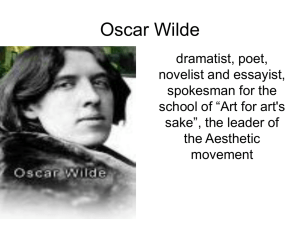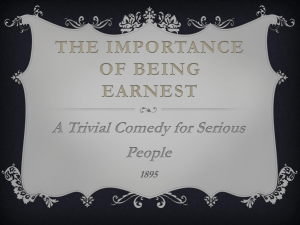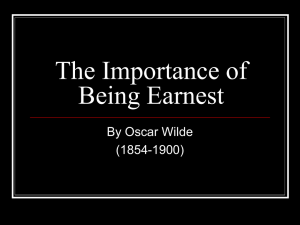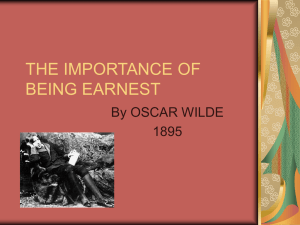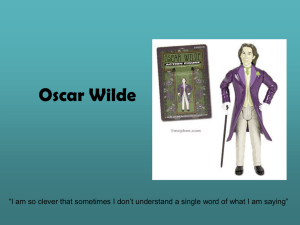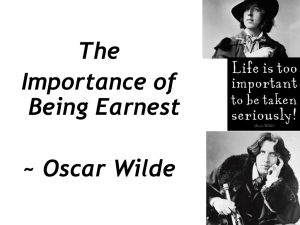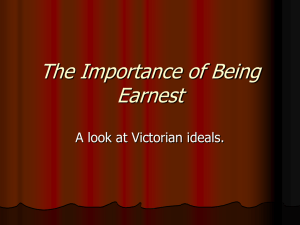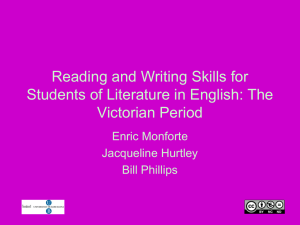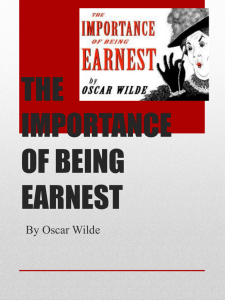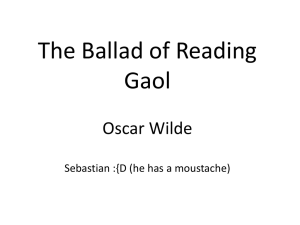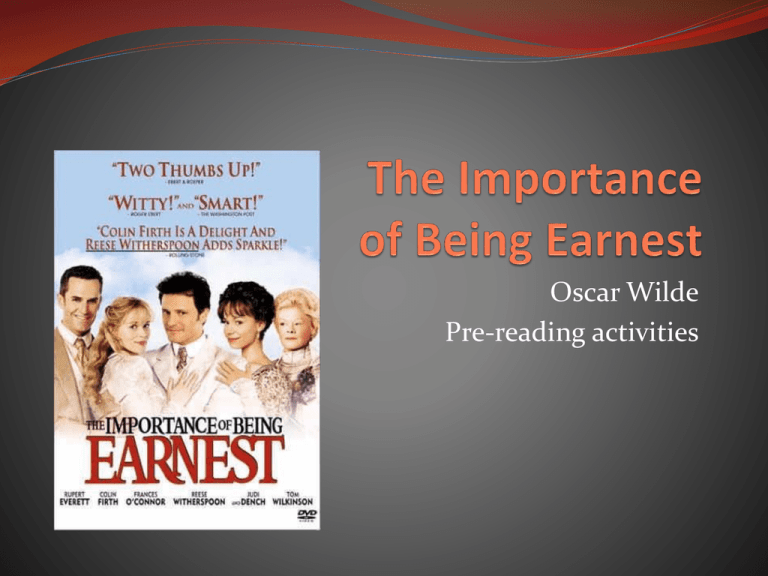
Oscar Wilde
Pre-reading activities
Comedy
Brainstorm comedic devices – what do
audiences find funny? How do actors and play writers
make people laugh?
Think, Pair, Share.
Parody, satire, irony.
Research Assignment
Complete an A4/3 sheet of paper with facts and
information about the following:
a) Oscar Wilde – biography
b) Victorian England – how is this time/place
characterised?
Do NOT use wikipedia.
Due Monday
Anticipation Guide
Complete the survey in 3 – 4 minutes (on your own).
T = true, N = never true, or S = sometimes true
___ Girls never marry the men they flirt with
___ It is absurd to have a hard and fast rule about what one should
read and what one shouldn’t.
___ Once a week is quite enough to dine with one’s own relations.
___ Health is the primary duty of life.
___ An engagement should come on a young girl as a surprise.
___ I don’t like novels that end happily.
___ It is not a really serious engagement if it hasn’t been broken off
at least once.
___ I am very fond of being looked at.
___ In matters of grave importance, style, not sincerity, is the vital
thing.
___ No woman should ever be quite accurate about her age.
Discuss and Predict
In pairs or groups of 3, compare your ideas and
responses to the statements. What did you think?
Is each statement TRUE? NEVER TRUE? Or
SOMETIMES TRUE?? If so, in what situation?
Why do some of the statements strike you as being
absurd? Or even funny?
Discuss. Keep the Anticipation Guide in your books,
we will return to it throughout the topic.
Each statement comes from the play. Predict a few
things about the play such as it’s tone and themes,
(eg. marriage).
Title
”The Importance of Being Earnest”
Use your own knowledge and the dictionary/
thesaurus to define the meaning of ‘earnest’. Complete
an iceberg to analyse the denotative and connotative
meanings, dig deep for analysis and clues into the play.
“Earnest”
Actual meanings?
Inferred
meanings?
When spelt ‘Ernest’, the word is a boy’s name. What does the word mean
when spelt ‘earnest’? With this in mind, what does the title suggest about
the play? Explain your ideas.
2. The tagline of the play is ‘A Trivial Comedy for Serious People’. Explain the
significance and implications of this, i.e. what does Wilde mean by ‘trivial’
and ‘serious’. How would the meaning and implications change if this
sentence was reversed (i.e. ‘A Serious Comedy for Trivial People’)?
3. Two of the central themes of the play are APPEARANCE & REALITY and
SOCIAL STATUS & EXPECTATIONS. For each theme, do a brainstorm to
show how these themes could be presented.
4. The play is a satirical comedy:
SATIRE - a literary tone used to ridicule or make fun of human vice or
weakness, often with the intent of correcting, or changing, the subject of the
satiric attack.
Satirical comedies are very common on television. ‘The Simpsons’ satirizes the
‘American Dream’; programmes such as ‘Family Guy’, ‘Arrested Development’
and ‘I’m Alan Partridge’ also contain satirical comedy.
Watch this clip from ‘The Office’ and see if you can identify WHY it is an
example of satire.
1.
Homework: Find an example each of PARODY and SATIRE – bring in the
youtube link or email it to me. Due tomorrow: Wednesday 3/8/11
Analyse opening scene
Sum up the setting and opening interaction between Lane
and Algernon. Identify and comment on the comedic
techniques used (motifs, inversions, non-sequitur, satire)
and how they present ideas about marriage and class
structure in Victorian England.
EXTENSION: Word play / puns / irony / farce / wit – do
any of these apply to the opening of Act 1 ?
HOMEWORK
Research the Aesthetics & Decadence movement in Victorian
England. Present your findings in an A3 poster with a balance
of visual and written information.
DUE THURSDAY 11th AUGUST
Research and Homework Tasks
Week
Date Due
Task
2
Thursday 11/08
A4 Research -Aesthetic and Decadence Movements
3
Tuesday 16/08
Map class structure in London, 1890’s. What it took
to be aristocratic, etc. Make poster chart show
different social status levels and what sorts of
occupations each might have, kind of lifestyle,
fashion, other things that distinguish classes.
3
Friday 19/08
Create own satiric epigrams, take cliched phrases
and twisting them as Algernon does with “in
married life 3 is company and 2 is none” or by
coming up with your own. Use these to write a brief
story about some element of our modern day society
4
Thursday 25/08
Draw and/or find pictures to create a set and
wardrobe for the play with each scene and each
character matched to pictures.
5
Tuesday 30/08
Research ONE other book/play Oscar Wilde wrote.
What makes his writing so good? Are there any
similarities between this and TIOBE? Include
pictures, quotes from him and from other sources.
Oscar Wilde
Reading activities
Structure / Setting /
Themes / Motifs & Symbols
Organisation (Structure)
Put this information into a graph.
The play is divided into 3 Acts. Acts I and II are about 20
pages long with 2 parts each and Act III is only about 10
pages long. The 1st act immediately addresses the conflict of
Jack’s separate identities, and this basic issue compounds
into several more conflicts all introduced in Act I. The act
also serves to give us most of the background information
for the main characters, even some of the ones that we
don’t meet until Act II such as Cecily. Act I also centres
around Jack’s dilemmas though Algernon is the main
character on the stage and has the wittiest lines. Act II
then proceeds to branch out from Jack to conflicts with
other characters. The action continues to rise as the
characters become entangled, but by the end of Act II
things have begun to sort themselves out. The purpose of
Act III, then, is for the plot to finally climax at what has
turned out to be its central focus: the barriers preventing
the marriage between Jack and Gwendolen.
Setting
The story takes place, according to Wilde, in London
in the present. However, the setting changes from the
city to the countryside of London, and Wilde’s present
was the 1890’s (the play was published in 1895).
Motifs and Symbols
Motif = recurring structure or literary device.
Symbol = recurring objects, characters, figures, colours.
Motifs include (1)puns, (2) inversion, (3) death and (4)‘the
dandy’.
What examples can you recall from the play that reveal
these motifs? Discuss how they are significant.
Symbols include the (1) double life, (2) food, (3) fiction and
writing.
What examples can you recall from the play that reveal
these symbols? Discuss how they are significant.
MOTIFS – Puns
In The Importance of Being Earnest, the pun, widely considered to be the lowest form of
verbal wit, is rarely just a play on words. The pun in the title is a case in point. The
earnest/Ernest joke strikes at the very heart of Victorian notions of respectability and
duty. Gwendolen wants to marry a man called Ernest, and she doesn't care whether the
man actually possesses the qualities that comprise earnestness. She is, after all, quick to
forgive Jack's deception. In embodying a man who is initially neither “earnest” nor
“Ernest,” and who, through forces beyond his control, subsequently becomes both
“earnest” and “Ernest,” Jack is a walking, breathing paradox and a complex symbol of
Victorian hypocrisy.
In Act III, when Lady Bracknell quips that until recently she had no idea there were any
persons “whose origin was a Terminus,” she too is making an extremely complicated
pun. The joke is that a railway station is as far back as Jack can trace his identity and
therefore a railway station actually is his “origin,” hence the pun. In Wilde's day, as in
the England of today, the first stop on a railway line is known as the “origin” and the
last stop as the “terminus.” There's also a whole series of implicit subsidiary puns on
words like line and connection that can refer to either ancestry or travel. Wilde is
poking fun at Lady Bracknell's snobbery. He depicts her as incapable of distinguishing
between a railway line and a family line, social connections and railway connections, a
person's ancestral origins and the place where he chanced to be found. In general, puns
add layers of meaning to the characters' lines and call into question the true or
intended meaning of what is being said.
Motifs - Inversion
One of the most common motifs in The Importance of Being
Earnest is the notion of inversion, and inversion takes many
forms. The play contains inversions of thought, situation, and
character, as well as inversions of common notions of morality or
philosophical thought. When Algernon remarks, “Divorces are
made in Heaven,” he inverts the cliché about marriages being
“made in heaven.” Similarly, at the end of the play, when Jack
calls it “a terrible thing” for a man to discover that he's been
telling the truth all his life, he inverts conventional morality.
Most of the women in the play represent an inversion of accepted
Victorian practices with regard to gender roles. Lady Bracknell
usurps the role of the father in interviewing Jack, since typically
this was a father's task, and Gwendolen and Cecily take charge of
their own romantic lives, while the men stand by watching in a
relatively passive role. The trick that Wilde plays on Miss Prism
at the end of the play is also a kind of inversion: The trick
projects onto the play's most fervently moralistic character the
image of the “fallen woman” of melodrama.
MOTIFS:
Death
Jokes about death appear frequently in The Importance of Being
Earnest. Lady Bracknell comes onstage talking about death, and in
one of the play's many inversions, she says her friend Lady
Harbury looks twenty years younger since the death of her
husband. With respect to Bunbury, she suggests that death is an
inconvenience for others—she says Bunbury is “shilly-shallying”
over whether “to live or to die.” On being told in Act III that
Bunbury has died suddenly in accordance with his physicians'
predictions, Lady Bracknell commends Bunbury for acting “under
proper medical advice.” Miss Prism speaks as though death were
something from which one could learn a moral lesson and piously
says she hopes Ernest will profit from having died. Jack and
Algernon have several conversations about how to “kill” Jack's
imaginary brother. Besides giving the play a layer of dark humour,
the death jokes also connect to the idea of life being a work of art.
Most of the characters discuss death as something over which a
person actually has control, as though death is a final decision one
can make about how to shape and colour one's life.
Motif - The Dandy
To the form of Victorian melodrama, Wilde contributed the figure of the dandy, a
character who gave the form a moral texture it had never before possessed. In Wilde's
works, the dandy is a witty, overdressed, self-styled philosopher who speaks in
epigrams and paradoxes and ridicules the cant and hypocrisy of society's moral
arbiters. To a very large extent, this figure was a self-portrait, a stand-in for Wilde
himself. The dandy isn't always a comic figure in Wilde's work. In A Woman of No
Importance and The Picture of Dorian Gray, he takes the form of the villains Lord
Illingworth and Lord Henry Wootton, respectively. But in works such as Lady
Windermere's Fan, An Ideal Husband, and The Importance of Being Earnest, Wilde
seems to be evolving a more positive and clearly defined moral position on the figure of
the dandy. The dandy pretends to be all about surface, which makes him seem trivial,
shallow, and ineffectual. Lord Darlington and Lord Goring (in Lady Windermere's Fan
and An Ideal Husband) both present themselves this way. In fact, the dandy in both
plays turns out to be something very close to the real hero. He proves to be deeply
moral and essential to the happy resolution of the plot.
In The Importance of Being Earnest, Algernon has many characteristics of the dandy, but
he remains morally neutral throughout the play. Many other characters also express
dandiacal sentiments and views. Gwendolen and Lady Bracknell are being dandiacal
when they assert the importance of surfaces, style, or “profile,” and even Jack echoes
the philosophy of the dandy when he comes onstage asserting that “pleasure” is the
only thing that should “bring one anywhere.” For the most part, these utterances seem
to be part of Wilde's general lampooning of the superficiality of the upper classes. The
point is that it's the wrong sort of superficiality because it doesn't recognize and
applaud its own triviality. In fact, Cecily, with her impatience with self-improvement
and conventional morality and her curiosity about “wickedness,” is arguably the
character who, after Algernon, most closely resembles the dandy. Her dandiacal
qualities make her a perfect match for him.
SYMBOLS -
The Double Life
The double life is the central metaphor in the play, epitomized in the
notion of “Bunbury” or “Bunburying.” As defined by Algernon,
Bunburying is the practice of creating an elaborate deception that
allows one to misbehave while seeming to uphold the very highest
standards of duty and responsibility. Jack's imaginary, wayward
brother Ernest is a device not only for escaping social and moral
obligations but also one that allows Jack to appear far more moral and
responsible than he actually is. Similarly, Algernon's imaginary invalid
friend Bunbury allows Algernon to escape to the country, where he
presumably imposes on people who don't know him in much the
same way he imposes on Cecily in the play, all the while seeming to
demonstrate Christian charity. The practice of visiting the poor and
the sick was a staple activity among the Victorian upper and uppermiddle classes and considered a public duty. The difference between
what Jack does and what Algernon does, however, is that Jack not only
pretends to be something he is not, that is, completely virtuous, but
also routinely pretends to be someone he is not, which is very
different. This sort of deception suggests a far more serious and
profound degree of hypocrisy. Through these various enactments of
double lives, Wilde suggests the general hypocrisy of the Victorian
mindset.
Symbol - Food
Food and scenes of eating appear frequently in The Importance of Being
Earnest, and they are almost always sources of conflict. Act I contains
the extended cucumber sandwich joke, in which Algernon, without
realizing it, steadily devours all the sandwiches. In Act II, the climax of
Gwendolen and Cecily's spat over who is really engaged to Ernest
Worthing comes when Gwendolen tells Cecily, who has just offered her
sugar and cake, that sugar is “not fashionable any more” and “Cake is
rarely seen at the best houses nowadays.” Cecily responds by filling
Gwendolen's tea with sugar and her plate with cake. The two women
have actually been insulting each other quite steadily for some time,
but Cecily's impudent actions cause Gwendolen to become even
angrier, and she warns Cecily that she “may go too far.” On one level,
the jokes about food provide a sort of low comedy, the Wildean
equivalent of the slammed door or the pratfall. On another level, food
seems to be a stand-in for sex, as when Jack tucks into the bread and
butter with too much gusto and Algernon accuses him of behaving as
though he were already married to Gwendolen. Food and gluttony
suggest and substitute for other appetites and indulgences.
SYMBOLS:
Fiction and Writing
Writing and the idea of fiction figure in the play in a variety of important ways.
Algernon, when the play opens, has begun to suspect that Jack's life is at least
partly a fiction, which, thanks to the invented brother Ernest, it is. Bunbury is
also a fiction. When Algernon says in Act I, “More than half of modern culture
depends on what one shouldn't read,” he may be making a veiled reference to
fiction, or at least reading material perceived to be immoral. In Act II, the idea
of fiction develops further when Cecily speaks dismissively of “three-volume
novels” and Miss Prism tells her she once wrote one herself. This is an allusion
to a mysterious past life that a contemporary audience would have recognized
as a stock element of stage melodrama. Cecily's diary is a sort of fiction as well:
In it, she has recorded an invented romance whose details and developments
she has entirely imagined. When Cecily and Gwendolen seek to establish their
respective claims on Ernest Worthing, each appeals to the diary in which she
recorded the date of her engagement, as though the mere fact of having written
something down makes it fact. Ultimately, fiction becomes related to the
notion of life as an art form. Several of the characters attempt to create a
fictional life for themselves which then, in some capacity, becomes real. Wilde
seems to regard as the most fundamentally moral those who not only freely
admit to creating fictions for themselves but who actually take pride in doing so
Theme
What points about life does Wilde seem to be making?
Consider: (A) the kinds of decisions characters made, their reasons for making them,
and the consequences of doing so. (B) the conflicts and how they are resolved. (C)
what the main characters learn in the course of the play. (D) the significance of the
play’s outcome.
Act 1
• Name a theme,
how does it fit
into this Act?
• Another theme,
how does it fit?
Act 2
Act 3
• Name a theme,
how does it fit
into this Act?
• Another theme,
how does it fit?
• Name a theme
how does it fit
into this Act?
• Another theme,
how does it fit?
Group work on themes- all 5!
To better understand the themes and to provide evidence and
1.
2.
3.
4.
conclusions about Wilde’s ideas – discuss each theme in a group.
Complete the following tasks.
Make a topic statement about the theme –show evidence that it is
your opinion and designed to build an argument.
Give 3 examples from specific places in the play which relate to the
theme and your argument about the theme.
Analyse each example – what does it mean to the audience, what
symbolic of deeper meanings does in also infer or suggest. How does
it link to similar examples of other crafting techniques in the play
which have the same effect.
Finish with a conclusion – sum up how well you think Wilde has
conveyed his theme through his examples / crafting of the play.
YOU HAVE 30 MINUTES
Themes
Satire on earnestness and triviality in the Victorian
period in England (late 19th Century) woven throughout
several themes:
1. Decadence: Wilde’s belief in art for art’s sake
applied to life and society, also embraced by several of
the characters in the book through which Wilde
simultaneously propels the idea and reveals the
ridiculousness of it: the term also has to do with self
indulgence, illustrated throughout the play (Algernon
eating everything, the idea of “Bunburying”, etc.)
Themes
2. Marriage: deliberately following British
literary tradition of Austen and others in
centering work on marriage, but satirising
Victorian views surrounding it, showing how
little it was based on love and how much on
maintaining or improving social status; the
subject of many of the most witty epigrams in
the play (mainly lines by Algernon, Lady
Bracknell, and Cecily); using superficiality of a
name being a barrier to marriage to show how
equally ridiculous it is for birthright to be a
barrier to marriage since an individual has little
control of either their name or their birthright.
Themes
3. Society: satirises Victorian society in
general, and twists facets of it in some cases,
such as where Algernon comments about
lower classes setting the example when
traditional Victorian views would have said
the opposite; “earnestness” in a way refers to
the earnestness of characters such as Lady
Bracknell who take society too seriously; Lady
Bracknell can be examined as the epitome of
Victorian female societal views, and Algernon
as quite the opposite.
Themes
4. Morality: this subject, like other
“important: issues such as marriage and death, is
treated with absolute triviality in the play as part
of Wilde’s satire; many of Algernon’s epigrams
strike us as funny because of the irony between
the moral code we are accustomed to and the
ridiculous morals he espouses.
Themes
5. Honesty; treated sometimes trivially and other
times quite seriously, becomes an ironic theme at the
end when Jack turns out to have been honest all along
though he had thought himself never to have been
entirely truthful; Jack, Algernon, Cecily and
Gwendolen turn out to have been earnest after all, not
about society as is Lady Bracknell, but about following
their own ambitions.
Point of View / Narrative Voice
As it is a play, Wilde reveals the story to an omniscient audience
who the characters are not aware of. The audience is given all the
clues to understand the mix-up long before the characters figure
it out, allowing the audience to enjoy the dramatic irony of
seeing the ridiculousness of the characters while the characters
take themselves so seriously.
TONE: The time period affects the tone in that it was a period of
Decadence in France and England. The concerns of the
characters are highly trivial and self-indulgent, and the whole
thing is satiric in its portrayal of their superficial entanglements.
Overall, the tone is humourous, ironic and satiric.
IRONY: The play is full of irony, but where it comes to its climax
is in the interrelations revealed at the end between the
characters and in Jack’s real name being Ernest, representing the
idea that he has been earnest all along in seeking the ambition of
his heart rather than bowing before society.
Comedic Conventions
Exaggeration
Incongruity (something that seems out of time, place
or character)
Anticipation
Deus ex machina
Ambiguity
Non Sequitur
Epigrams
Tasks for Act 1
Up to the arrival of Lady Bracknell:
How are the characters of Algernon and Jack/Ernest
created for the audience?
•
What is the effect of the interchange between Algernon and Lane? How is
Wilde ridiculing the conventions of class structure in this interchange?
•
Give examples of different types of humour and how they work (quote and
comment)
2) Draw up a list of statements made about marriage by different characters and
comment on the impressions given.
3) ‘A trivial comedy for serious people’ –list words/phrases where trivial events
are treated with overblown seriousness. Identify comic methods.
4) How are women in Act 1 shown to have the upper hand? (Explore more than
simply what happens on stage.)
5) What ideas do you gain about ‘society’ from your reading of the first Act?
Find quotations relating to status, behaviour and morality, and culture.
1)
•
Use the play/stage directions in Act 1 to sketch the layout /design of the
set as you imagine it to look. Imagine you are directing a production
of this play. How would you position Algernon / Lane and their
movements in the opening scene?
Extension work
Things you can do to read more widely and gain more
insight into the play and the writer.
a) Read Oscar Wilde’s other works – “A Woman of No
Importance”, and “An Ideal Husband”. Also, his
novel, “A Picture of Dorian Gray”
b) Read criticisms and biography work – some titles are
“Oscar Wilde: The Critical Heritage”, “The Artist as
Critic: Critical Writings of Oscar Wilde.” “Oscar
Wilde: A Biography” and many more…search
through the public library and online.
c) Cliffnotes online and various other sources (Spark
Notes). Enotes.
Do now:
KEY VOCABULARY
Find the meaning of each of the following terms which
relate to the purpose of The Importance of Being Earnest.
Record the meaning and think of examples from modern
texts, novels, stories, films, tv or song.
Farce
Satire
Irony
Trivial
Next
SHARED READING OF TEXT
In your allocated groups of 4/5, read from page 9 to the end
of Act 1.
As you read, pause and record (i.e. Task 3 on your sheet)
“words/phrases where trivial events are treated with
overblown seriousness. Identify comic methods.”
EXIT PASS
3,2,1 RiQ – what have you learned about how Wilde treats
trivial versus serious topics in Act 1.
Marriage
Marriage: deliberately following British literary
tradition of Austen and others in centring work on
marriage, but satirising Victorian views surrounding
it, showing how little it was based on love and how
much on maintaining or improving social status; the
subject of many of the most witty epigrams in the
play (mainly lines by Algernon, Lady Bracknell, and
Cecily); using superficiality of a name being a barrier
to marriage to show how equally ridiculous it is for
birthright to be a barrier to marriage since an
individual has little control of either their name or
their birthright.
How does Wilde present his views on marriage?
(consider style, tone, language, dialogue, stage /
drama / comedic conventions, characterisation,
setting, point of view – eg audience response )
Marriage
Here are a number of things which Victorian society
placed importance on, especially in determining
prospects for marriage.
a)
b)
c)
d)
e)
f)
g)
h)
Birth order
Legitimacy
Parentage
Family heritage
Family wealth
Social class
Christening
Gender
Act 1: Task 5
What ideas do you gain about ‘society’ from your
reading? Find quotes relating to….
Status….
Behaviour….
Morality….
“Really, if the lower
orders don’t set us a
good example, what on
earth is the use of
them?”
“They seems, as a class,
to have absolutely no
sense of moral
responsibility”.
“I believe it is customary
in good society to take
some slight refreshment
at five o’clock”
“Good heavens! Is marriage
so demoralising as that?”
Culture….
NEXT: How has Act 1
established the rising action,
story development, conflicts
and complications to follow in
subsequent Acts (2 and 3)?
Foreshadowing
Algy calls Jack Ernest, already foreshadowing of complications ahead
(A1)
2. Gwendolen’s refusal to love anyone but a man named Ernest
foreshadows conflict in her relationship with Jack.
3. Revelation of Jack’s parentage being unknown foreshadows a
possibility for surprises about relations later on.
4. Algy’s comments about wanting to meet Cecily foreshadows his visit.
5. Jack and Algy’s conversation about women calling each other sister
foreshadows what will really happen when Cecily and Gwendolen
meet.
6. Algy copies down Jack’s country address and tells Lane he’ll be
Bunburying, again foreshadowing his visit to Cecily.
7. Jack’s comment that Algy’s Bunburying will get him into a scrape
foreshadows the complications that arise in Act II.
8. Prism mentions a lost manuscript, foreshadowing her involvement
in whatever will turn up at the end.
9. Cecily’s refusal to love anyone but a man named Earnest foreshadows
conflict in her relationship with Algernon.
10. Lady Bracknell knows Prism and questions about lost baby,
foreshadowing again Prism’s involvement in the mystery.
1.
Exit Pass
Make 3 predictions about what is to happen in the next
Act. Give reasons and point to evidence in Act 1 to
support your comments.
1.
2.
3.
Drama Terminology Game
Your group are aiming to apply the ‘TERMS’ to a
section of the play (Act II).
Cut and paste the terms onto the A3 poster, put an
example / quotation from Act II next to it.
Discuss the terms and their examples as you go.
Winning group will have the most number of terms
with examples on their poster.
To finish: look up the definitions of the remaining
Drama Terms and record these on your poster.
Tasks for Act 2 – work in pairs
1) Explore how the country characters are different to the town
characters through:
- Language
- Occupations / activities
- Attitudes to each other
- Social class
2) How is the theme of deceit developed in this Act?
3) Collect examples of matched language /stylistic patterns for the
6 paired characters. How are similar patterns revealed in the
action of the play?
4) How do running jokes contribute to the comedy of this Act
(German; food; education; writing)?
5) What attitudes towards religion appear in this Act? Consider
christening; church services; relevance of religion to daily life.
6) Compare Lane, Merriman and Miss Prism as employees and as
comic characters. What do they bring to the play, which would
otherwise be missing?
Well-made play:
A very structured and rigid plot and a climax that
takes place very close to the end of the story, with
most of the story taking place before the action of
the play; much of the information regarding such
previous action would be revealed through thinly
veiled exposition. Following that would be a series
of causally-related plot complications.
A recurrent device is the use of letters or papers
falling into unintended hands, in order to bring
about plot twists and climaxes.
The majority of well-made plays are comedies,
often farce.
Summary and response to A2
Act 2 opens in the “Garden at the Manor House” where
Cecily is watering flowers and Miss Prism is calling her for
a lesson in German grammar. This sets the scene for the
country characters “Surely such a utilitarian occupation …is
rather Moulton’s duty than yours?”
The Act finishes with Jack insisting Algernon leave, “Why
don’t you go?”, and Algernon replying that he hasn’t
finished his tea yet, “there is still one muffin left”.
Summarise this Act, paying particular attention to your
OWN personal response, (you must evaluate / judge /
express opinion) of the Act Wilde has created.
This homework task is due on
Tuesday next week.
Research ONE other book/play Oscar Wilde wrote.
What makes his writing so good? Are there any
similarities between this and TIOBE? Include pictures,
quotes from him and from other sources.
Tasks for Act III – work in pairs
1) In the battle of the sexes, which side, if any, do you
2)
3)
4)
5)
consider ‘wins’? Give evidence.
How is humour enhanced through comic timing and
patterns in this Act?
Continue notes on the use of inflated language when
used for trivialities (refer to subtitle of play – A
Trivial Comedy for Serious People).
What links are there between social attitudes, money
and marriage?
How does the third act fulfil the needs of the ‘wellmade play”?
PLAN response to this essay question.
The Importance of Being Earnest has been described as a
‘timeless play’. How do you account for its continuing
success?
Appreciate intentions
Use language of
and purpose of
______________________________________________________
drama –
playwright
AS Literature essays techniques and
Write in 3rd person
conventions
*4- 8 paragraphs
(as an authority) but
*Topic sentences
express own
evaluations
*Detailed and well-developed explanations
of point of view (yours as well as recognising
Examine the
effect of
those of other ‘experts’ and ‘critics’)
playwrights craft
*Direct and precise referencing / quotation,
on the audience
examination / exploration and critical analysis
Recognise difference
of ideas.
between audience of
the day (1899) and
*Relevance to essay topic (tie-backs and linking)
today
Topic Sentences
Wilde’s exaggeration of trivial objects and issues add to
the comedic effect of this timeless play.
The use of this successful play’s witty dialogue and
epigrams appeals to audiences over time.
The depth of Wilde’s comedic conventions allow
audiences to reinterpret the timeless play differently as
knowledge and life experiences accumulate.
Essay Question
In ‘The Importance of Being Earnest’ there is a tension
between the artificial behaviour dictated by society and
the natural way in which people wish to behave. How far
do you find this a valid comment on the play?
2. For what dramatic purposes does Wilde use a) food and
b) concern for property in The Importance of Being
Earnest?
3. The Importance of Being Earnest has been described as a
‘timeless play’. How do you account for its continuing
success?
4. For Wilde’s original audiences, the overturning of gender
roles within The Importance of Being Earnest was funny
because it seemed so unlikely. What sources of humour
might a modern audience find?
5. Discuss the implications of class differences in the
success of The Importance of Being Earnest as a comedy.
1.
Essay Questions continued…
6) How are Victorian attitudes to marriage and respectability
explored in The Importance of Being Earnest?
7) How do the ‘country characters’ cast light on the
pretensions of society as exposed in The Importance of
Being Earnest?
8) What does the hidden character of Lord Bracknell add to
our understanding and enjoyment of the play?
9) How does Wilde use satire to ‘explode’ the social world he
writes about in The Importance of Being Earnest?
10) How far would you agree with the view that The
Importance of Being Earnest is ‘a play without a moral,
existing for its own sake, for its own perfection,
communicating no message’?
Essay questions cont…
11) How far do you agree with Wilde’s description of The
Importance of Being Earnest: ‘The first act is
ingenious, the second beautiful and the third
abominably clever’?
12) ‘Humour, like drama, arises from conflict.’ How far is
this true in The Importance of Being Earnest?
13) How far do you agree that the characters in The
Importance of Being Earnest wear masks that cover
real feelings, so preventing the audience’s engagement
with them on an emotional level?
14) How important are ideas of parentage and family in
The Importance of Being Earnest?
1. Don't change horses
…until they stop running.
2. Strike while the …
wasp is close.
3. It's always darkest before
….Daylight Saving Time..
4. Never underestimate the power of
….termites.
5. You can lead a horse to water but
…How?
6. Don't bite the hand that
…looks dirty.
7. No news is
…impossible
8. A miss is as good as
…a Mr.
9. You can't teach an old dog new
…maths
10. If you lie down with dogs… you'll
stink in the morning...
12. The pen is mightier than the …..pigs.
13.
An idle mind is ….
…the best way to relax
14. Where there's smoke there's ….pollution.
15. Happy the bride who ...gets all the
presents.
16. A penny saved is …..not much.
17. Two's company, three's …the Musketeers.
18. Don't put off till tomorrow what …you put
on to go to bed.
19. Laugh and the whole world laughs
with…you, cry and you have to blow your nose.
20. There are none so blind as …
…Stevie Wonder ..
21. Children should be seen and not …
…spanked or grounded.
22. If at first you don't succeed …
..get new batteries.
23. You get out of something only what you
…See in the picture on the box
24. When the blind lead the blind …get out of
the way.
25. A bird in the hand
…is going to poop on you.
26. Better late than
…Pregnant
Epigrams from Wilde –
truth, lie, funny, serious? Or sarcastic?
In matters of grave importance, style, not sincerity, is the vital
thing.
• Misfortunes one can endure. But to suffer for one’s own
faults—ah!—there is the sting of life.
• Fashion is merely a form of ugliness so unbearable that we
are compelled to alter it ever six months.
• Marriage is the triumph of imagination over intelligence.
Second marriage is the triumph of hope over
experience.
• The only difference between saints and sinners is that every
saint has a past while every sinner has a
future.
• Bigamy is having one wife too many; monogamy is the same.
• Religion is the fashionable substitute for belief.
• Education is an admirable thing, but it is well to remember
from time to time that nothing that is worth
knowing can be taught.
Some cause happiness wherever they go; others whenever
they go.
A true friend stabs you in the front.
We are all of us living in the gutter, but some of us are looking
at the stars.
Nowadays people know the price of everything, and the value
of nothing.
To love yourself is the beginning of a lifelong affair!
The public is wonderfully tolerant. It forgives everything
except genius.
•But what is the difference between literature and journalism?
...Journalism is unreadable and literature
is not read. That is all.
One’s real life is often the life that one does not lead.
• Whenever people agree with me I always feel I
must be wrong.
• Why was I born with such contemporaries?
• When the gods wish to punish us, they answer our
prayers.
• Only dull people are brilliant at breakfast.
• Work is the curse of the drinking classes.
• It is absurd to divide people into good and bad.
People are either charming or tedious.
• Experience is the name everyone gives to their
mistakes.
Scandal is gossip made tedious by morality.
Only the shallow know themselves.
A little sincerity is a dangerous thing, and a great
deal of it is absolutely fatal.
There is nothing in the world like the devotion of a
married woman. It’s a thing no married man knows
anything about.
One must have some sort of occupation nowadays. If
I hadn’t my debts I shouldn’t have anything to think
about.
Always forgive your enemies. Nothing annoys them
so much.
It is very easy to endure the difficulties of one’s
enemies. It is the successes of one’s friends that are
hard to bear.
Nothing succeeds like excess.
Women have a much better time than men in this
world. There are far more things forbidden to them.
Themes – class list…
Marriage
Hypocrisy
Deception
Decadence
Gender
Womanhood
Education
Sincerity/Earnestness
Morality
Identity / Illegitamacy
Wealth
Triviality (of eg death)
Social Status
Humour
Class divide
Country versus City
Religion
HOMEWORK: Categorise this list into 5 or 6. Many of them are related.
For each category write a brief description of the theme as you understand
it. Due next lesson.
Essay question - collaborate
In ‘The Importance of
Being Earnest’ there is a
tension between the
artificial behaviour
dictated by society and
the natural way in which
people wish to behave.
How far do you find this
a valid comment on the
play?
A) Analyse the question
B) Brainstorm to generate
lots of ideas / examples
/ opinions
C) Choose your key points
Prepare an outline of
ideas and examples for
a timed essay on
Thursday 19th March
(Period 5)
In ‘The Importance of Being Earnest’ there is a tension between
the artificial behaviour dictated by society and the natural way in
which people wish to behave. How far do you find this a valid
comment on the play?
(a) Wilde ridicules social pretensions in Victorian society – the
(b)
(c)
(d)
(e)
double identity is a motif used to show the conflict between
how people WANT to behave and how the MUST behave
according to conventions of the time.
The main plot which provides the central conflict - Jack and
Gwendolen’s pursuit of marriage and the obstacles of his name,
her mother and his birth serve to emphasise the absurdity of
Victorian values.
Commentary on the upper and lower classes and their places in
society.
Roles of the female characters – the power, control and
manipulation they perform under the thinly veiled disguise of
etiquette and good –manners
Rivalry between country and city life
Character Analysis – Cloze Tests
Under each of these headings write your impressions / describe these
types of characters from what you understand about their representation.
Female Characters
Male Characters
Country Characters
City Characters
Aristocracy
Servants
The names of the characters
John (Jack) Worthing
Algernon Moncrieff
Reverend Canon Chasuble
Lady Bracknell
Gwendolen Fairfax
Cecily Cardew
Miss Prism
Merriman
Lane
What does each name lead you to expect of the
character?
Characters
Do now:
Design a diagram which shows the inter-relationships
between all characters in this play.
Use arrows with labels to explain the relationships.
Female Characters
Gwendolyn, Cecily, Lady Bracknell, Miss Prism
1st Dimension
(a)What they look like?
Costume elements
(b)What they act like? Acting
style, stage directions,
interactions with others
(c) What they say? Quotes,
subjects, topics they refer
to, language, epigrams
Does this character
reveal any themes
in particular?
2nd and 3rd Dimensions
(a) What others say about
them?
(b) What / Who in society
they represent?
(c) Inferences you can make
about their character
/nature from their
speech/behaviour?
(d) Who they are related too
and their relationships
with others?
(e) Position they ultimately
end up in?
Male Characters
Jack/Ernest, Algernon, Rev. Chausable, Lane/Merriman
1st Dimension
(a)What they look like?
Costume elements
(b)What they act like? Acting
style, stage directions,
interactions with others
(c) What they say? Quotes,
subjects, topics they refer
to, language, epigrams
Does this character
reveal any themes
in particular?
2nd and 3rd Dimensions
(a) What others say about
them?
(b) What / Who in society
they represent?
(c) Inferences you can make
about their character
/nature from their
speech/behaviour?
(d) Who they are related too
and their relationships
with others?
(e) Position they ultimately
end up in?
Do you agree with the following statements concerning the motives
of Wilde’s characters?
Algernon does not want to be
restrained by social and family
obligations. He has invented a sick
friend so that he can do what he
wants when he wants!
Cecily has invented an imaginary
lover because she is a bored,
romantic teenager who dreams of a
more exciting life away from the
countryside.
Jack uses his unreliable brother so
that he can play at being both a
responsible and serious guardian in
the countryside and a riotous partygoing young man when in London.
In the case of Jack and Cecily,
which “persona” reflects
their true personality?
For all three characters, what
do their imaginary lives
suggest about the society in
which they live?
Class debate:
Moot: Parents should have a role in choosing their children’s
husband/wife.
Prepare an argument FOR
this moot.
AFFIRMATIVE
Prepare an argument
AGAINST this moot.
NEGATIVE
Extension
Apply literary and
critical theory to the
play.
Michael Foucalt
Aestheticism
Queer theory
Other?

